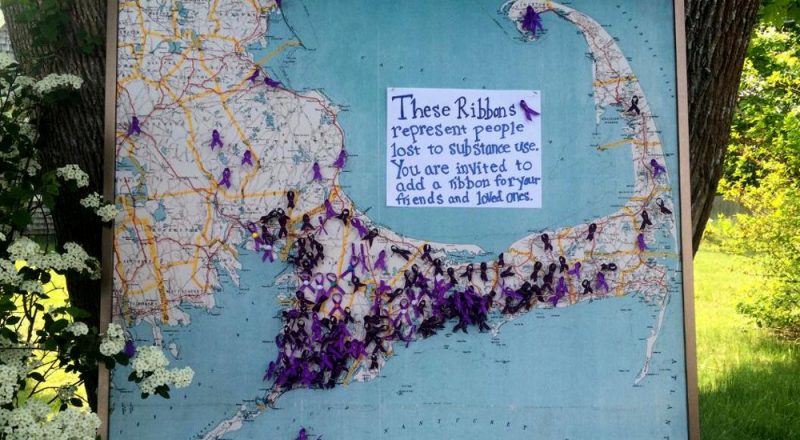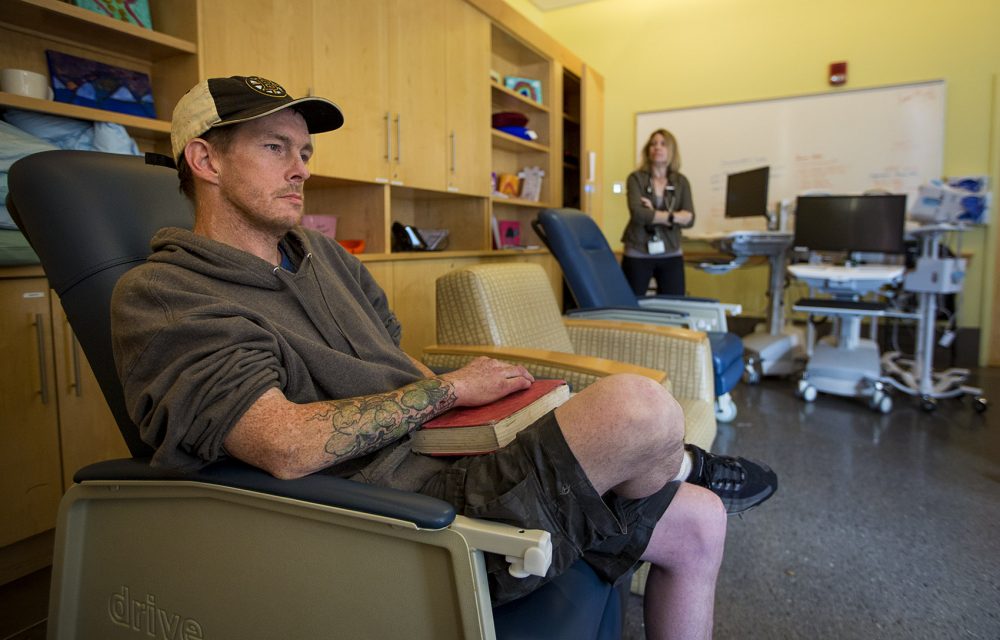Episode 23: Back from the Edge


A map of Cape Cod with ribbons representing those lost to substance abuse at the AIDS Support Group of Cape Cod. Photo by Ryan Sweikert for the Transom Story Workshop.
Across New England, there’s been an epidemic of opioid addiction, overdose, and death. This hour, we dig deep into the causes of this crisis with health reporter Martha Bebinger. We travel to Cape Cod to hear firsthand the stories of those affected. We also look for solutions, including for those most at risk of overdose: inmates getting out of prison. And we examine the role of New England’s traditional dairy industry in creating the landscape we love, as we remember forgotten farms.
An Increasing Death Count
The crisis of opioid addiction and overdose has taken hold especially hard in New England.
According to a new report from the Centers for Disease Control and Prevention – the rate of overdose deaths nationally nearly tripled between 1999 and 2014. Heroin and prescription opioids now account for nearly two thirds of drug overdose deaths in America.
Overdose deaths went up by at least 20 percent between 2014 and 2015 in every New England state, well above the national average.

Tommy, a repeat patient at the Supportive Place for Observation and Treatment, at the Boston Health Care for the Homeless Program, says the facility has — and will continue to — save lives. Photo by Jesse Costa for WBUR.
Massachusetts saw annual opioid-related deaths more than triple between 2010 and 2015. Data for 2016 is not out yet, but it looks like those rates will be higher still.
WBUR health reporter Martha Bebinger joins us to talk about some of the stats, and she takes us to a unique facility in Boston where drug users are being watched over by doctors and nurses — while they are high. We recorded this conversation in October of 2016.
As of January 3, 2017, the SPOT clinic has had 2,551 visits and seen 397 individual visitors.
In 2015, Barnstable County on Cape Cod was ranked first in Massachusetts in terms of overdose deaths per capita.
Part of the response has been increased use of the overdose reversal drug naloxone, or Narcan, by first responders and citizens. Independent producer Ryan Sweikert brings us a story told by family members, police, and EMS workers struggling with the problem.
Piecing It Together
You may have heard of hackathons for solving computing problems. But can a room full of smart people hack the opioid crisis? That’s what doctors, counselors, current and former addiction patients, coders, and others attempted to do over a weekend in Boston last September.

Massachusetts General Hospital and the GE Foundation hosted a hack-a-thon at District Hall to come up with novel ideas and technologies to combat opioid abuse. Photo by Joe Difazio for WBUR.
Ideas included sensors on bathroom floors that would send an alert when someone is lying down; a mobile syringe exchange and counseling center; and a Fitbit style blood monitor that could inject naloxone into the wearer if needed. Martha Bebinger covered the story.
Watch a video about the hackathon produced by the Consortium for Affordable Medical Technologies:
Since we first aired Martha’s report on the opioid crisis hackathon in October 2016, there have been some developments. The team that came up with the idea for wearable pouches that would contain naloxone and signal that the wearer is an ally has received funding from the GE Foundation. The group – We Are Allies – is beta testing the pouches, and has a website where you can sign up to participate.
The GE Foundation is still considering other teams for a ten thousand dollar award, and plans to announce the winner at an event at Massachusetts General Hospital later this month. Judges will also consider ideas that weren’t presented at the hackathon, like an equine therapy program for drug users.
The group that’s most at risk for a fatal opioid overdose is ex-prisoners in the first few weeks after being released. Even those who don’t overdose are very likely to relapse into drug use within a month of leaving jail or prison.
WNPR reporter Lori Mack visited a pilot program underway in New Haven, Connecticut that takes a new approach to addiction treatment. It starts before an inmate gets out from behind bars.
Read More reporting on opioid addiction from the New England News Collaborative.
When the Milk Runs Dry
Dairy farms have been folding at an alarming rate. According to a new documentary film, “Forgotten Farms,” New England has lost 10,000 dairy farms in the last 50 years, and many of the remaining farms are struggling. We speak with Sarah Gardener, producer of the film and Associate Director of the Center for Environmental Studies at Williams College.
“Forgotten Farms” will be screening around New England in the spring. To find a showing near you, visit the film’s website.
About NEXT
NEXT is produced at WNPR.
Host: John Dankosky
Producer: Andrea Muraskin
Executive Producer: Catie Talarski
Digital Content Manager/Editor: Heather Brandon
Contributors to this episode: Martha Bebinger and Lori Mack
Music: Todd Merrell, “New England” by Goodnight Blue Moon, “It’s Clearing Now” by Birigid Mae Power, “Harbour Lights” by Miaoux Miaoux,”Draft Daughter’s Blues” by the Be Good Tanyas
We appreciate your feedback! Send praise, critique, suggestions, questions, story leads, and milk mustache selfies to next@wnpr.org.
